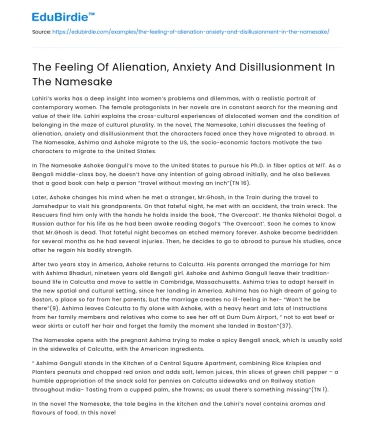Lahiri’s works has a deep insight into women’s problems and dilemmas, with a realistic portrait of contemporary women. The female protagonists in her novels are in constant search for the meaning and value of their life. Lahiri explains the cross-cultural experiences of dislocated women and the condition of belonging in the maze of cultural plurality. In the novel, The Namesake, Lahiri discusses the feeling of alienation, anxiety and disillusionment that the characters faced once they have migrated to abroad. In The Namesake, Ashima and Ashoke migrate to the US, the socio-economic factors motivate the two characters to migrate to the United States.
In The Namesake Ashoke Ganguli’s move to the United States to pursue his Ph.D. in fiber optics at MIT. As a Bengali middle-class boy, he doesn’t have any intention of going abroad initially, and he also believes that a good book can help a person “travel without moving an inch”(TN 16).
Save your time!
We can take care of your essay
- Proper editing and formatting
- Free revision, title page, and bibliography
- Flexible prices and money-back guarantee
Later, Ashoke changes his mind when he met a stranger, Mr.Ghosh, in the Train during the travel to Jamshedpur to visit his grandparents. On that fateful night, he met with an accident, the train wreck. The Rescuers find him only with the hands he holds inside the book, ‘The Overcoat’. He thanks Nikholai Gogol. a Russian author for his life as he had been awake reading Gogol’s ‘The Overcoat’. Soon he comes to know that Mr.Ghosh is dead. That fateful night becomes an etched memory forever. Ashoke become bedridden for several months as he had several injuries. Then, he decides to go to abroad to pursue his studies, once after he regain his bodily strength.
After two years stay in America, Ashoke returns to Calcutta. His parents arranged the marriage for him with Ashima Bhaduri, nineteen years old Bengali girl. Ashoke and Ashima Ganguli leave their tradition-bound life in Calcutta and move to settle in Cambridge, Massachusetts. Ashima tries to adapt herself in the new spatial and cultural setting, since her landing in America. Ashima has no high dream of going to Boston, a place so far from her parents, but the marriage creates no ill-feeling in her- “Won’t he be there”(9). Ashima leaves Calcutta to fly alone with Ashoke, with a heavy heart and lots of instructions from her family members and relatives who come to see her off at Dum Dum Airport, “ not to eat beef or wear skirts or cutoff her hair and forget the family the moment she landed in Boston”(37).
The Namesake opens with the pregnant Ashima trying to make a spicy Bengali snack, which is usually sold in the sidewalks of Calcutta, with the American ingredients.
“ Ashima Ganguli stands in the Kitchen of a Central Square Apartment, combining Rice Krispies and Planters peanuts and chopped red onion and adds salt, lemon juices, thin slices of green chili pepper – a humble appropriation of the snack sold for pennies on Calcutta sidewalks and on Railway station throughout India- Tasting from a cupped palm, she frowns; as usual there’s something missing”(TN 1).
In the novel The Namesake, the tale begins in the kitchen and the Lahiri’s novel contains aromas and flavours of food. In this novel the dinners and parties were Indian Bengali food is served on occasions of communion among the members of the Bengali community. Throughout the novel, food plays a major role and it acts as a link between the characters and their own traditions. Hence, those Bengali traditions become “Americanized”.
In the three-room apartment in Boston Ashima feels homesick and upset. She feels spatially and emotionally dislocated from the comfortable ‘home’ of her father full of loved ones and wishes to go back. Ashima remains lost in the memories of her ‘home’. She spends on re-reading Bengali short stories, poems, and articles from the Bengali Magazines she has bought with her from Calcutta. Thinking of Motherhood in a foreign land disturbs her badly: “ That was happening so far from home, unmonitored and unobserved by those whom she loved, had made it more miraculous still. But she is terrified to raise a child in a country where she is related no one, where she knows little, where life seems so tentative and space”(6).
Ashima is longing for her homeland. She does not have a happy life in het Holland, because there is always thought of her family ruined her mind. If she had been in India, she would have been surrounded by innumerable relatives, but now there is no one there to accompany her. She severely misses her Relatives in Calcutta. Her unhappiness and loneliness are reflected in the attempts to recreate her homeland through memory and Nostalgia.
She sinks in nostalgia, “ In India, she thinks to herself, women go home to their parents to give birth, away from husbands and in-laws and household cares, Retreating briefly to childhood when the baby arrives”(TN 4)
Ashima spends her days in Cambridge by recollecting her past life in Calcutta. She doesn’t want to give birth to her child and grown-up her child in an alien environment. She wants to move to Calcutta. After the birth of Gogol, she earnestly desires to go back to Calcutta to raise her Child there in the company of dear and new ones: “ I am saying don’t want to raise Gogol alone in this country. It’s not right. I want to go back”(32). But for her husband’s sake, she decides to stay there and keeps all her emotional turmoil and disappointments to herself. The nostalgia for Calcutta affects her all the more.






 Stuck on your essay?
Stuck on your essay?

